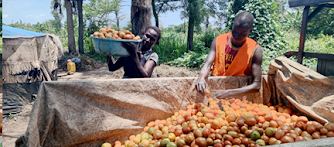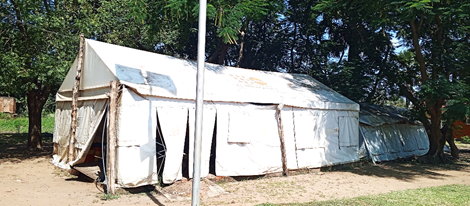How DRDIP is helping to safeguard the environment in Madi-Okollo
 |
| Setting up the briquettes making machine |
Members
of Aporo Energy Saving Stoves and Briquette Making received not just funding
and training but encouragement from component II of DRDIP, seeking to preserve
the delicate balance of nature. These dedicated members have pioneered
innovative solutions to counter the ecological challenges faced by their
community.
They
are creating energy-saving stoves and briquettes, designed to reduce the
reliance on charcoal consumption. The stoves, crafted with ingenuity, not only
minimize charcoal usage but also seamlessly incorporates the use of briquettes.
Briquettes are a concoction of garden waste, charcoal dust, and mud. Briquette's
usage presents a sustainable alternative, rescuing the trees that once faced
rampant cutting in Pawor Sub County.
Santos
Wokorwach, the Chairperson of the Community Project Management Committee for
Aporo Energy Saving Stoves and Briquette Making sees a glimmer of hope in the community
initiated project. “Beyond salvaging the environment, this initiative offers a
lifeline to the community by providing a sustainable source of income through
the sale and use of stoves and briquettes”, he said.
Traditionally,
residents of Aporo village relied heavily on selling charcoal, a practice that
casted a dark shadow on green life in Pawor Sub County. With reducing levels of
precipitation, people and livestock remained at crossroads because charcoal
burning continued to eat up their once rich tree cover.
The
DRDIP supported group is determined to revive the past. The plan is set: with
stoves priced between Shs15,000 to Shs20,000, aiming to sell 20 to 30 units
daily. The group plans to expand their reach. They envision saving enough funds
to acquire a means of transport for efficient distribution of their
eco-friendly products.
 |
| Group members making energy saving stoves |
“We are targeting to make enough sales locally so that we can acquire a pickup truck that will support us to transport our products beyond the boundaries of Madi-Okollo district or even beyond West Nile region”, Wokorwach explains.
DRDIP’s
financial support to a tune of Shs70 million for this community initiative is a
boulder of hope in the fight against environmental degradation. The
beneficiaries used this funding to procure machinery and initial materials
required for making briquettes and energy saving stoves for commercial
purposes.
Betty
Acai, a dedicated member of the group, looks at the project as a catalyst for
development. “Not only does it promise increased income for the community, it
is also a barricade to environmental degradation”, she said. Acai highlights
the detrimental impact of deforestation on crop yields, a problem that the
energy-saving stoves and briquettes project seek to address.
Another
group member, 24-year-old Doreen Fucaru, candidly admits to their past
involvement in tree cutting for charcoal, a practice they have now forsaken
with the advent of the DRDIP supported sub-project.
Fucaru
said, “we have also been successful in sensitizing the communities to
reconsider their choices by dropping the practice of tree cutting and adopting
the energy saving options that come through our products”. Fucaru envisions the
financial gains from their sustainable enterprise aiding in the education of
their children and meeting health needs of their families.
The
plight of environmental destruction extends beyond Aporo village, resonating
across Madi-Okollo district, where charcoal business has become a survival
necessity for many families. The consequences are stark, with massive
environmental destruction leading to prolonged droughts and erratic weather
patterns.
William Onzima, the District Natural Resource Officer, grimly reports that approximately 70% of the district's environment has succumbed to the ravages of charcoal business.
“This is one of the best initiatives by DRDIP to conserve
the environment and it requires more funding to expand it further beyond just
one village, we hope the World Bank will continue funding this component in the
second phase”, Onzima said.
The
Aporo Energy Saving Stoves and Briquette Making project, initiated in mid-2023
stands as a beacon of hope in the fight against environmental degradation. The
efforts of the group’s dedicated individuals echo beyond Aporo, aiming to
create a ripple effect of positive change across Madi-Okollo district.



Comments
Post a Comment